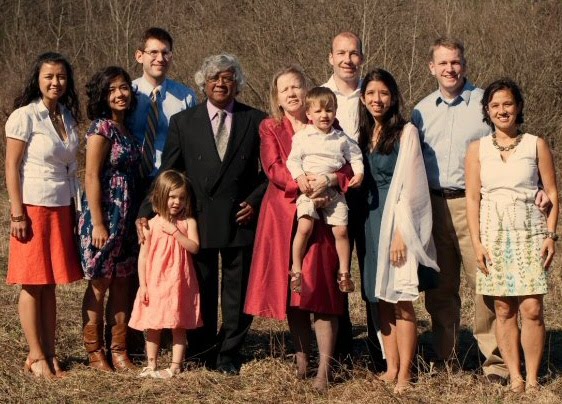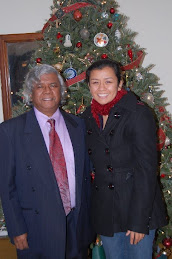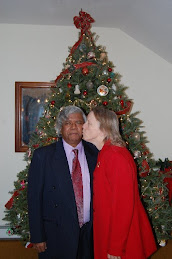Good morning,
Praise to the Lord, the Almighty, the King of all creation. It is going to be one of the ten best days of November. We will met for our Mid-week gathering with a meal at 6.00 PM. A young couple, missionaries to Papua , New Guinea, will be joining us this evening.
I spent some time yesterday in a stone quarry located on the top of a mountain. I know the operator of the quarry. I married him and his wife 31 years ago this month. It was a glorious day to travel to the quarry. We saw some dear grazing unhurriedly. The colors on the mighty oaks are still brilliant.
I was born in a village surrounded by majestic mountains. Most the villagers worshipped these mountains, offering animal sacrifices to them. These mountains are located 7000 feet above the sea level. When we were young wild elephants, wild buffaloes, and tigers roamed there. My dad was a hunter who, in his lifetime, killed 33 tigers and scores deer and other wild animals for meat. We grew up on wild meat.
While visiting the mountain yesterday I was reminded of the beautiful mountains back in Orissa, India. Alice and I walked for over 4 miles under the moonlit and starry sky last night. It was brilliant and the brilliantly starry sky was stunning.
I have been reading from Psalm 121 this morning. This Psalm is called the “Songs of Ascent”, sung by Jews traveling to Jerusalem for the high holy days. We read in the Gospels how Jesus as a boy of twelve made the pilgrimage with his parents. It is very likely that He sang these psalms, and later sang them with His disciples. Today many people continue to recite Psalm 121 at the beginning of a journey. It has been called the “Traveler’s Psalm” and is an affirmation of God’s powerful and providential protection.
Isaac Bashevis Singer once confessed, “I only pray when I’m in trouble…but I’m in trouble all the time, and so I pray all the time.” Where do we turn when we’re in trouble, when life hits us hard? Where does our help come from? There have been times in our lives when we can look back at an instance and say, “If it weren’t for God’s protection, I would have been killed.” What sustains us in our darkest hours? The reassurance of Psalm 121 brings us from fear to faith.
Many people are blindsided by the beauty of the opening statement of Psalm 121, and have misunderstood the author’s intent. We picture someone being inspired by a mountain range, finding strength in the rugged, hilly landscape. Part of the problem that strengthens this misconception is the King James rendering: “I will lift up mine eyes unto the hills, from whence cometh my help.” Yet, the hills are exactly where the psalmist does NOT find strength. He looks higher than the hills. The NIV correctly puts it in the form of a question, “I lift up my eyes to the hills—where does my help come from?” Then the answer is immediately given,
Isaac Bashevis Singer once confessed, “I only pray when I’m in trouble…but I’m in trouble all the time, and so I pray all the time.” Where do we turn when we’re in trouble, when life hits us hard? Where does our help come from? There have been times in our lives when we can look back at an instance and say, “If it weren’t for God’s protection, I would have been killed.” What sustains us in our darkest hours? The reassurance of Psalm 121 brings us from fear to faith.
Many people are blindsided by the beauty of the opening statement of Psalm 121, and have misunderstood the author’s intent. We picture someone being inspired by a mountain range, finding strength in the rugged, hilly landscape. Part of the problem that strengthens this misconception is the King James rendering: “I will lift up mine eyes unto the hills, from whence cometh my help.” Yet, the hills are exactly where the psalmist does NOT find strength. He looks higher than the hills. The NIV correctly puts it in the form of a question, “I lift up my eyes to the hills—where does my help come from?” Then the answer is immediately given,
“My help comes from the Lord, the Maker of heaven and earth.”
One name for God is El-Shaddai, “the most high God”. He is above all others; He is our “higher power”.
Heathen/Gentile nations worshipped and feared the sun and the moon, and people today continue to trust in the stars (astrology/horoscopes). The psalmist looked beyond the hills, beyond the sun, moon, and stars to the One who stood on the edge of nothing and spoke the universe into existence. We are assured on the text, “the sun will not harm you by day, nor the moon by night” (vs 4). Wiccan, Native American, and New Age religions continue to worship nature instead of its Creator. This is known as pantheism.
Heathen/Gentile nations worshipped and feared the sun and the moon, and people today continue to trust in the stars (astrology/horoscopes). The psalmist looked beyond the hills, beyond the sun, moon, and stars to the One who stood on the edge of nothing and spoke the universe into existence. We are assured on the text, “the sun will not harm you by day, nor the moon by night” (vs 4). Wiccan, Native American, and New Age religions continue to worship nature instead of its Creator. This is known as pantheism.
The prophet Jeremiah declared, “Truly the hills are a delusion—the idolatrous commotion on the mountains” (3:23). Jesus assured us, “I am with you always.” We don’t need any “supplemental help” from the sun or the moon.
Though we may worship nature or bow down to idols, yet we are still susceptible to idolatry, trusting in anything other than God. An idol is anything we love, rely on, and obey more than God.
Our help is heavenward, not earthbound. We cry out for help, and our help comes “from the Lord, the Maker of heaven and earth” (vs 2). To look anywhere else ends in futility and disappointment. Vs 3 declares that God “will not let your foot slip.” We find our security in God. Roads in ancient Israel were strewn with dangerous rocks and stones, and robbers were a constant threat. This was before the time of the New Testament in which protected Roman roads which made travel much safer than it had been previously.
Though we may worship nature or bow down to idols, yet we are still susceptible to idolatry, trusting in anything other than God. An idol is anything we love, rely on, and obey more than God.
Our help is heavenward, not earthbound. We cry out for help, and our help comes “from the Lord, the Maker of heaven and earth” (vs 2). To look anywhere else ends in futility and disappointment. Vs 3 declares that God “will not let your foot slip.” We find our security in God. Roads in ancient Israel were strewn with dangerous rocks and stones, and robbers were a constant threat. This was before the time of the New Testament in which protected Roman roads which made travel much safer than it had been previously.
The brief book of Jude says that God is “able to keep us from stumbling” (vs 24). Peter assured us that we are “kept by the power of God” (I Peter 1:5). Though the paths of life are often difficult and perilous, God will not allow our feet to slip.
Psalm 121 helps us meet straight-on the issue of how to deal with fears and insecurities in a dangerous world. For instance, when the Israelites made their pilgrimage to Jerusalem their homes were left unprotected. We are assured in vs 3 that God “will not slumber nor sleep”. He watches over us every step of the way. He is with us. Soldiers can rest from battle because guards are placed along the perimeter. In the same way, we are garrisoned by the eyes of God’s Providence night and day.
Verse 5 says that God is our “shade” on our right hand. The desert is an unforgiving place where the sun burns and the unrelenting heat can sap our strength. In the Middle East it can get up to 120 degrees in the Summer months. Next in the text the Psalmist assured us that the moon won’t harm us by night(?). People have long feared the power of the moon to affect their minds. People still say all sorts of craziness can happen during a full moon. Being “moonstruck” is to become unstable, to lose one’s reason. The word “lunacy” comes from the word Luna, another name for the moon. If we walk with God, He will guard and renew our minds (Romans 12:1-2). Verse 7 says that God will keep us from “harm”. This could be translated “evil” (RSV). The Christian life isn’t a quiet garden of escape where we can walk and talk with our Lord; rather, it’s finding strength in the midst of trying circumstances in a difficult world.
Psalm 121 helps us meet straight-on the issue of how to deal with fears and insecurities in a dangerous world. For instance, when the Israelites made their pilgrimage to Jerusalem their homes were left unprotected. We are assured in vs 3 that God “will not slumber nor sleep”. He watches over us every step of the way. He is with us. Soldiers can rest from battle because guards are placed along the perimeter. In the same way, we are garrisoned by the eyes of God’s Providence night and day.
Verse 5 says that God is our “shade” on our right hand. The desert is an unforgiving place where the sun burns and the unrelenting heat can sap our strength. In the Middle East it can get up to 120 degrees in the Summer months. Next in the text the Psalmist assured us that the moon won’t harm us by night(?). People have long feared the power of the moon to affect their minds. People still say all sorts of craziness can happen during a full moon. Being “moonstruck” is to become unstable, to lose one’s reason. The word “lunacy” comes from the word Luna, another name for the moon. If we walk with God, He will guard and renew our minds (Romans 12:1-2). Verse 7 says that God will keep us from “harm”. This could be translated “evil” (RSV). The Christian life isn’t a quiet garden of escape where we can walk and talk with our Lord; rather, it’s finding strength in the midst of trying circumstances in a difficult world.
Phillips Brooks, renowned pastor of Boston’s Trinity Church, stated, “Do not pray for easy lives; pray to be stronger people. Do not pray for tasks equal to your powers. Pray for powers equal to your tasks.”
In Christ,
Brown
Saturday , November 5.2011
Praise and worship service:
First United Methodist Church , Endicott
Sponsored by Union Center UMC
6PM Gathering- Coffeee- Fellowship
6.30PM Worship
Music: Laureen Naik
Speaker: Rev William Turner










No comments:
Post a Comment